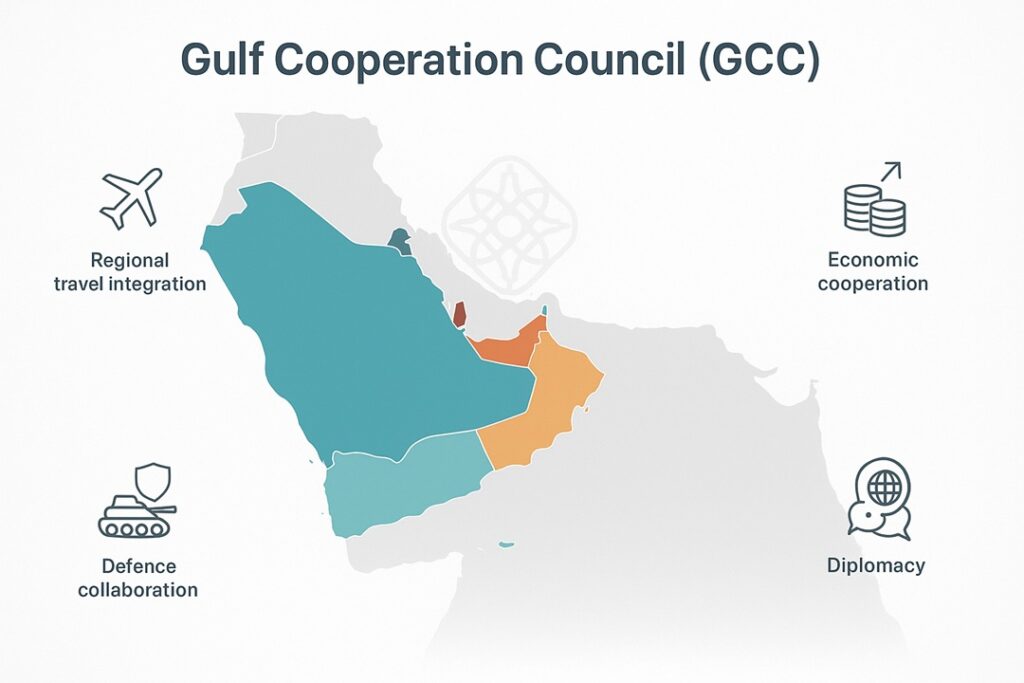GCC Moves Toward a Unified Travel Framework

Context
In early 2025, the Gulf Cooperation Council (GCC) approved a major reform in regional mobility by introducing a unified travel system aimed at simplifying intra-GCC movement. This reflects the bloc’s growing emphasis on deeper integration and coordinated travel procedures.
Why in News Approval of Unified Travel System
The GCC has endorsed a single-point travel clearance mechanism enabling citizens to complete all travel checks at one location.
Announcement Venue 42nd Interior Ministers Meeting
The framework was announced during the 42nd GCC Interior Ministers’ Meeting held in Kuwait City.
Pilot Phase UAE and Bahrain as Initial Implementers
The pilot phase is set to begin in December 2025 with the UAE and Bahrain adopting the unified travel system.
Full Rollout Expansion to All Six Member States
After successful testing, the model will be extended to Saudi Arabia, Oman, Qatar, Kuwait, Bahrain, and the United Arab Emirates.
Strategic Significance Schengen-Style Coordination
The new mechanism mirrors the EU’s Schengen-style travel coordination, signalling an effort to enhance regional mobility and integration.
GCC Overview Regional Alliance in the Gulf
The GCC is a political and economic grouping comprising six Gulf nations working toward collective progress and stability.
Members Six Gulf Countries
The member states include Saudi Arabia, UAE, Kuwait, Qatar, Bahrain, and Oman.
Establishment Formed in 1981
The GCC was founded in 1981 to promote cooperation and integration among Gulf nations.
Headquarters Located in Riyadh
The GCC Secretariat is headquartered in Riyadh, Saudi Arabia.
Objective Strengthening Regional Integration
The primary aim is to enhance cooperation in political, economic, and security domains.
Economic Focus Trade and Common Market Vision
The GCC works toward economic integration through trade, investment, and long-term plans for a unified market.
Political Coordination Shared Diplomatic Engagement
Member states collaborate on regional diplomatic issues and common geopolitical challenges.
Defence Collaboration Collective Security Efforts
The GCC emphasizes coordinated defence initiatives and joint security arrangements.
Social and Cultural Cooperation Strengthening Regional Identity
The organization promotes cultural ties and social programs to reinforce shared regional identity.
Organizational Structure Supreme Council as Apex Authority
The Supreme Council, composed of heads of state, is the highest decision-making body and follows annual rotating presidency.
Ministerial Council Policy Coordination Unit
The Ministerial Council, comprising Foreign Ministers, meets quarterly to propose policies and execute decisions.
Secretariat General Administrative and Executive Wing
The Secretariat General oversees implementation, prepares reports, organizes meetings, and coordinates overall functioning.
Conclusion
The unified travel system marks a significant step toward establishing seamless mobility within the Gulf region. By promoting ease of movement and deeper cooperation, the GCC aims to strengthen economic ties, enhance integration, and build a more connected regional bloc.
Source : TOI
